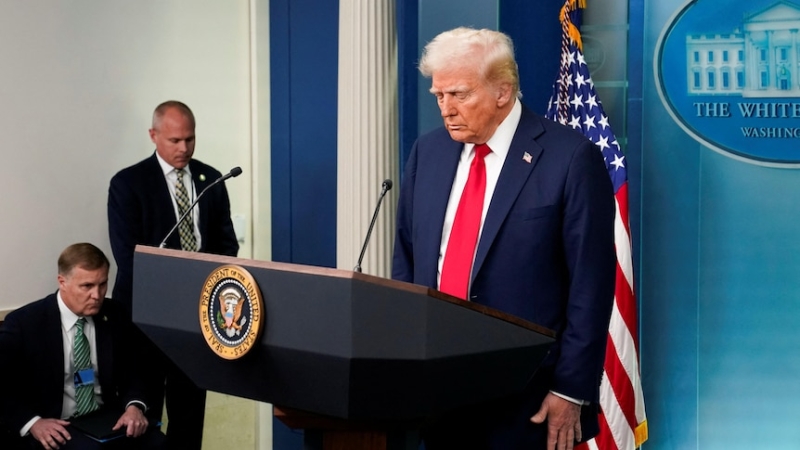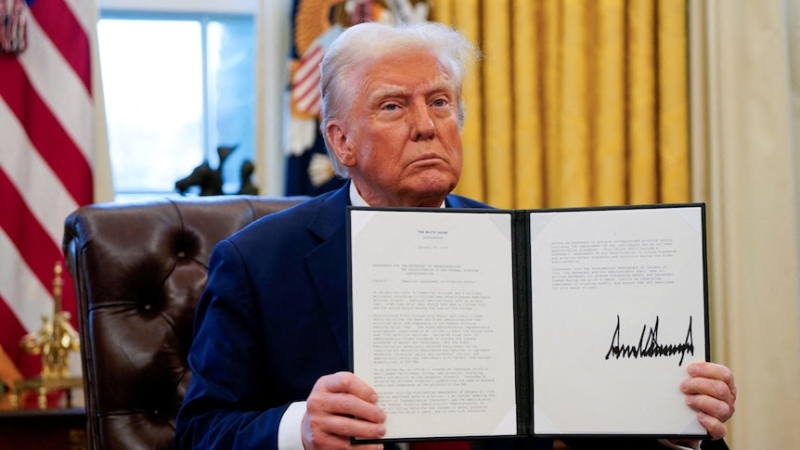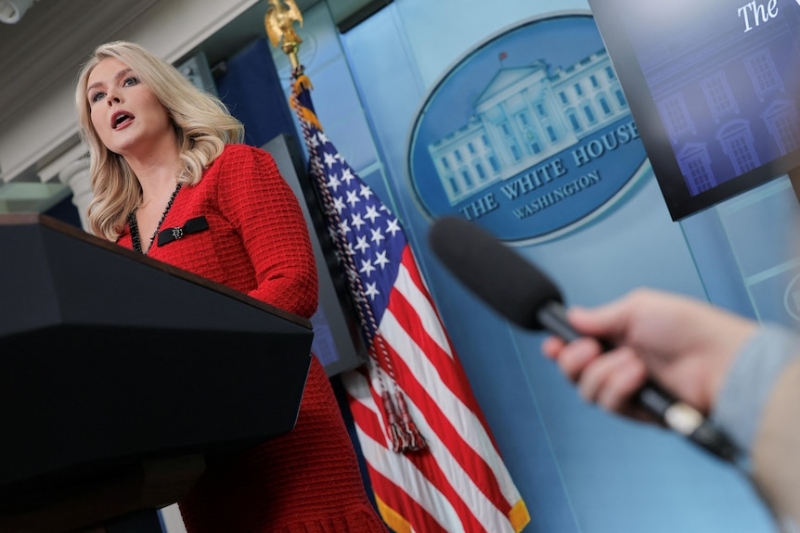Donald Trump held a moment of silence before apportioning blame. (Reuters: Elizabeth Frantz)
He began with a sombre tone.
"This was a dark and excruciating night in our nation's capital and in our nation's history — a tragedy of terrible proportions," Donald Trump told the packed room of journalists.
"As one nation, we grieve for every precious soul that has been taken from us so suddenly."
He asked those at Thursday's press conference to join him in a moment of silence to reflect on the 67 lives lost the night before.
But that moment proved to be the proverbial calm before the storm.
An almost instant pivot from mourning to anger.
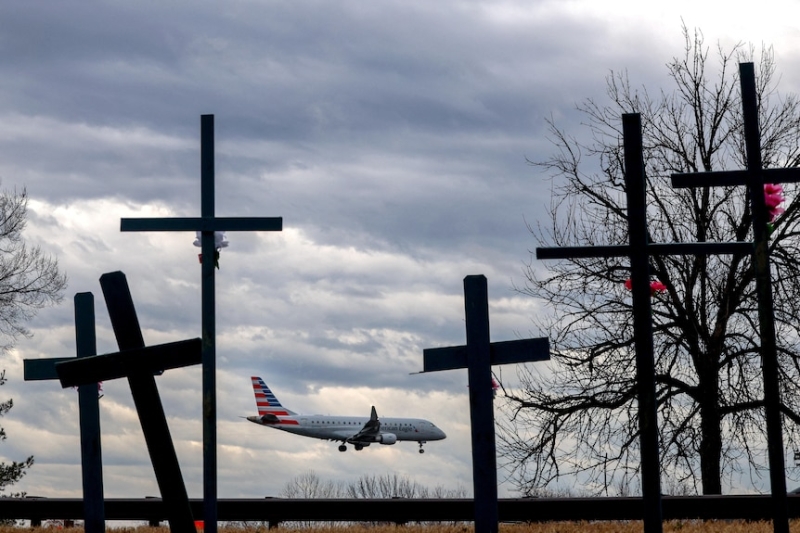
Crosses line a roadway near the airport in memory of the crash victims. (Reuters: Evelyn Hockstein)
The president of the United States unleashed a blizzard of accusations, quickly suggesting blame for the collision.
"We do not know what led to this crash," he admitted, "but we have some very strong opinions and ideas, and I think we'll probably state those opinions now."
His strongest opinion? That progressive policies had allowed incompetent people into critical jobs.
He mocked the Federal Aviation Administration (FAA) for its "diversity push," claiming the agency was too focused on inclusion and wanted people with severe disabilities to become air traffic controllers.
He insisted that air traffic controllers need to be "talented, naturally talented geniuses," implying that a person with a disability couldn't be one.
Trump also took a direct swipe at former transportation secretary Pete Buttigieg, sarcastically calling him a "real winner" before swearing from the podium: "He's a disaster. Now he's just got a good line of bullshit."
Has an American president ever profanely insulted a political opponent while trying to console a grieving nation in the wake of a horrific tragedy?
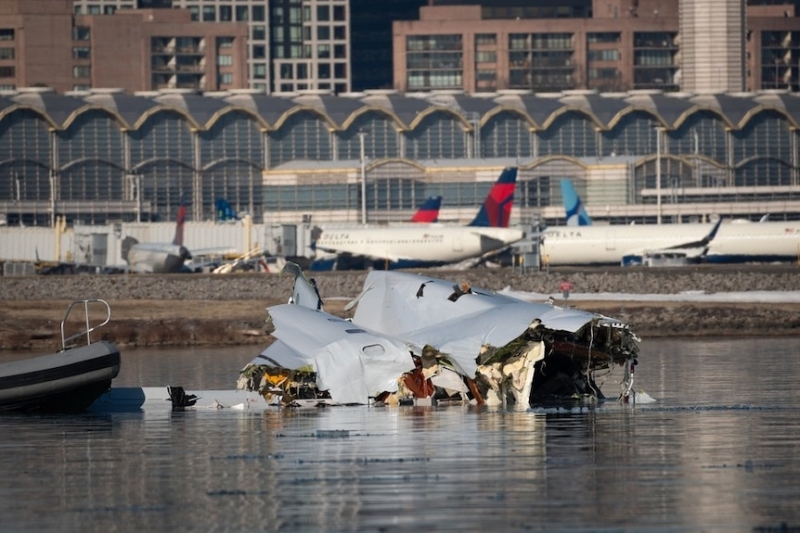
Crews are still retrieving the wreckage of both aircraft from the Potomac River. (Supplied: US Coast Guard/Petty Officer 1st Class Brandon Giles)
A few kilometres away from where Trump was delivering his tirade, divers were still in the frigid, dark waters of the Potomac, undertaking the unimaginable task of searching for bodies — bringing some level of comfort to the bereaved families.
While they worked in silence, the commander-in-chief used his platform not to honour their efforts, not to order flags flown at half-mast in respect for the victims, but to make a political point.
Politics of a tragedy
In the face of a tragedy like this, most politicians steer clear of direct partisan attacks — either because they recognise it as distasteful or because they believe the public would find it so.
Trump holds no such qualms.
To a hammer, everything is a nail.
To Trump, a tragedy is an opportunity — to play politics.
To rail against what he sees as one of the great ills of America: the push for diversity.
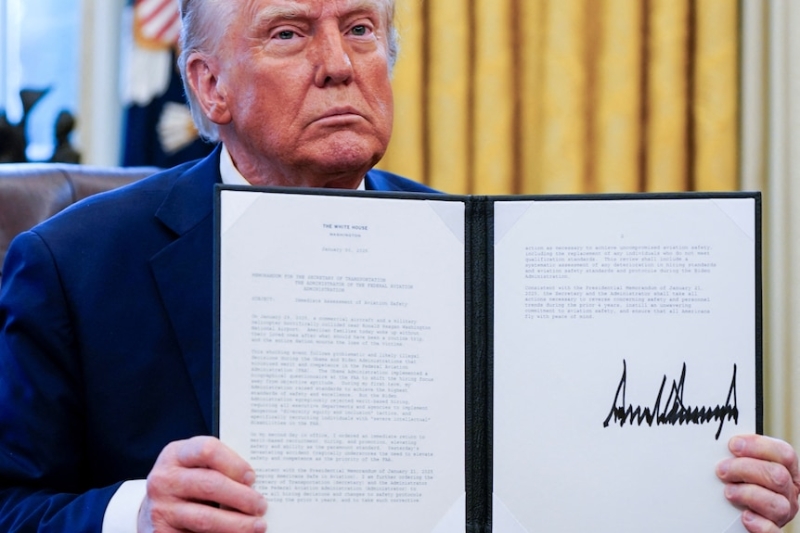
Donald Trump ordered an investigation into hiring policies in air traffic control. (Reuters: Elizabeth Frantz)
When pressed for evidence that diversity hiring had contributed to the crash, President Trump simply replied: "It just could have been."
Pressed again, he responded: "Because I have common sense, OK? And unfortunately, a lot of people don't."
If it turns out that the individuals involved in this tragedy were hired despite failing to meet the accepted standards of the job, Trump may feel vindicated.
But there is no evidence that this occurred.
The employees working in the control tower that night must now be under immense psychological pressure, having witnessed and been involved in such a catastrophic event.
To then have the president suggest that incompetence played a role likely only compounds their pain.
The Overton window keeps shifting
The culture war over "woke" policies has only intensified in recent years, and Trump's instinct is to continuously fan the flames.
Trump says air crash cause unknown, but he blames DEI and Democrats
Photo shows Donald Trump speaks with a US flag behind him.
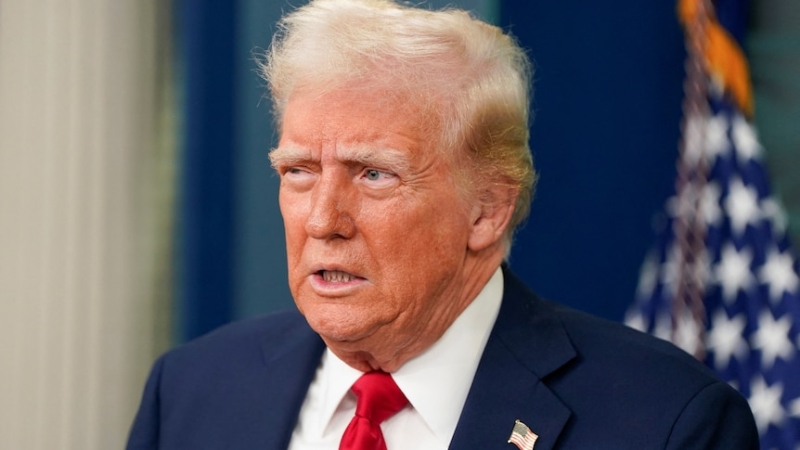
He has campaigned to dismantle policies designed to address systemic disadvantages by providing opportunities to marginalised groups. He argues these policies are unfair and lead to lower standards.
He is not alone.
His ally, Elon Musk, has also aggressively pushed this narrative. A year ago, the billionaire provoked outrage when he criticised United Airlines and Boeing for efforts to hire non-white pilots and factory workers.
Musk even mocked the acronym DEI (diversity, equity and inclusion) by deliberately misspelling it as "DIE," writing on X:
"It will take an airplane crashing and killing hundreds of people for them to change this crazy policy of DIE."
The belief that diversity is being prioritised over competence has taken root within the MAGA movement. So, when this tragedy occurred, it was almost instinctive for Trump to blame DEI policies — despite offering no evidence to support the claim.
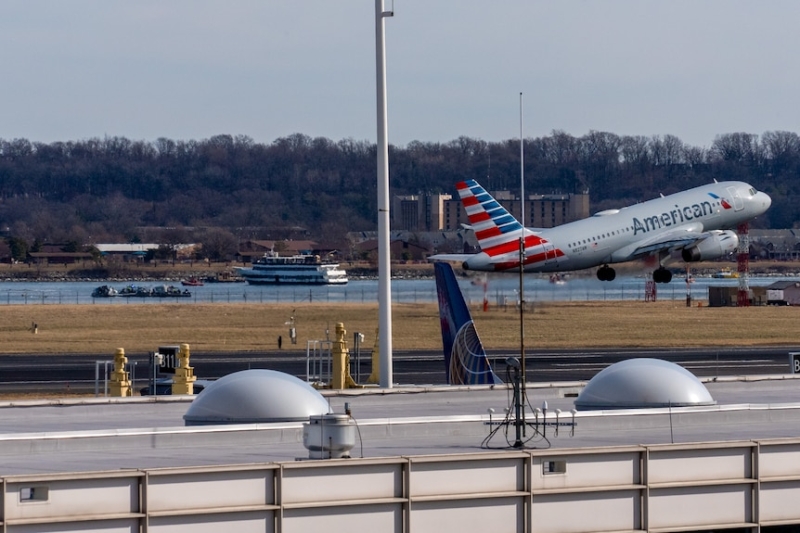
Reagan Washington National Airport reopened as a recovery operation took place on the Potomac River. (ABC News: Cameron Schwarz)
A similar reaction followed the wildfires that devastated Los Angeles. The tragedy was swiftly politicised, with the city's fire chief facing the brunt of the criticism.
Kristin Crowley, a 22-year veteran and the first LGBTQ fire chief in LAFD history, was targeted by conservative commentator Megyn Kelly.
Kelly called her an "obese lesbian" and raged that the department was too focused on diversity, claiming it was being run by "overweight, out-of-shape women."
It was cruel, personal language.
Yet, it says everything about how far the Overton window — the range of subjects and arguments politically acceptable to the mainstream population — has shifted in America that such remarks no longer shock the public.
Trump argues that America should be "colourblind" and a true meritocracy, where diversity is not a goal in itself.
But whatever one's opinion on DEI programs, the most telling aspect of Trump's response to this tragedy is what it reveals about his leadership.
What this tells us about Trump's second term
In the lead-up to his second term, there were questions about whether Trump might soften his approach.
How could such a catastrophic crash happen in DC?
Photo shows The white wreckage of a plane floats not far from the green wreckage of a military helicopter in a blue river.
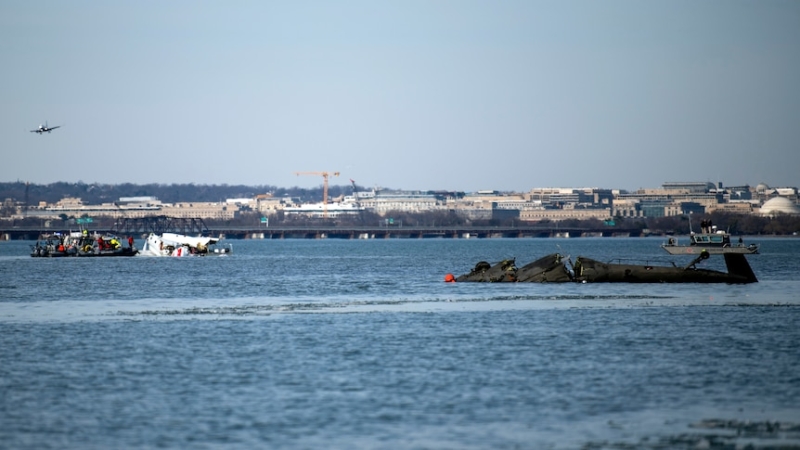
Would winning re-election — including the popular vote and stronger support from minority groups — satisfy his ego? Would he become more conciliatory, particularly in moments that demand it?
His response to this tragedy gives us a clear answer.
Trump remains the same politician he has always been.
He sees every day, and every event, as an opportunity to push his agenda, to shape America in his desired vision, and to attack his political enemies.
Donald Trump never does sombre for long.

